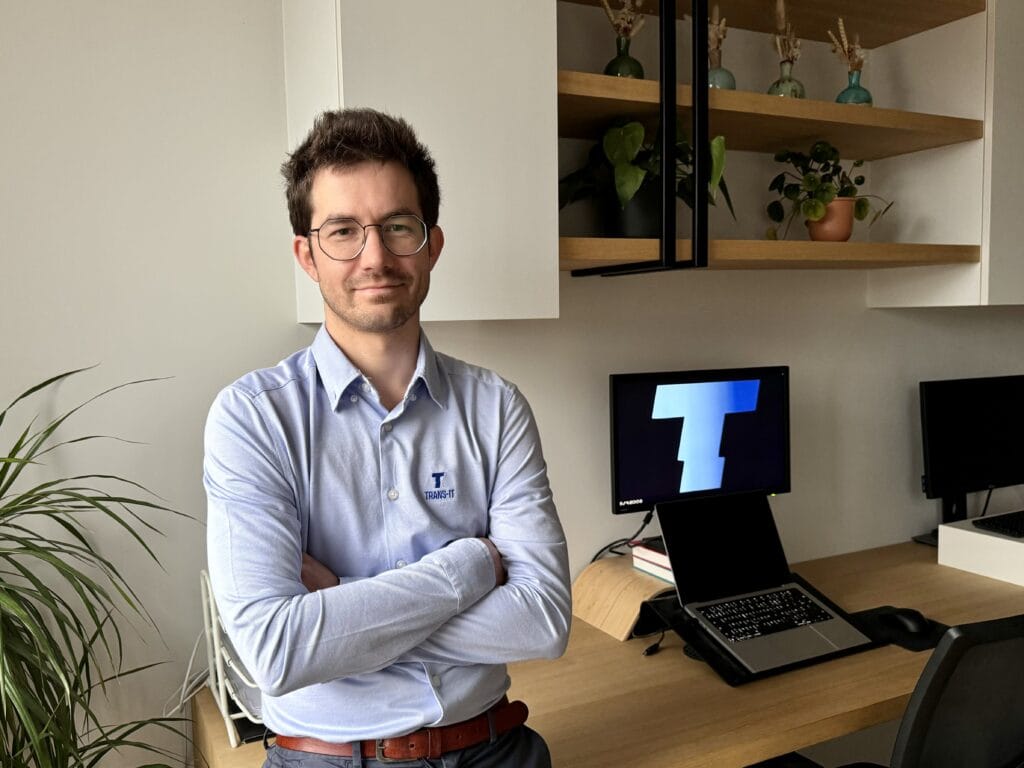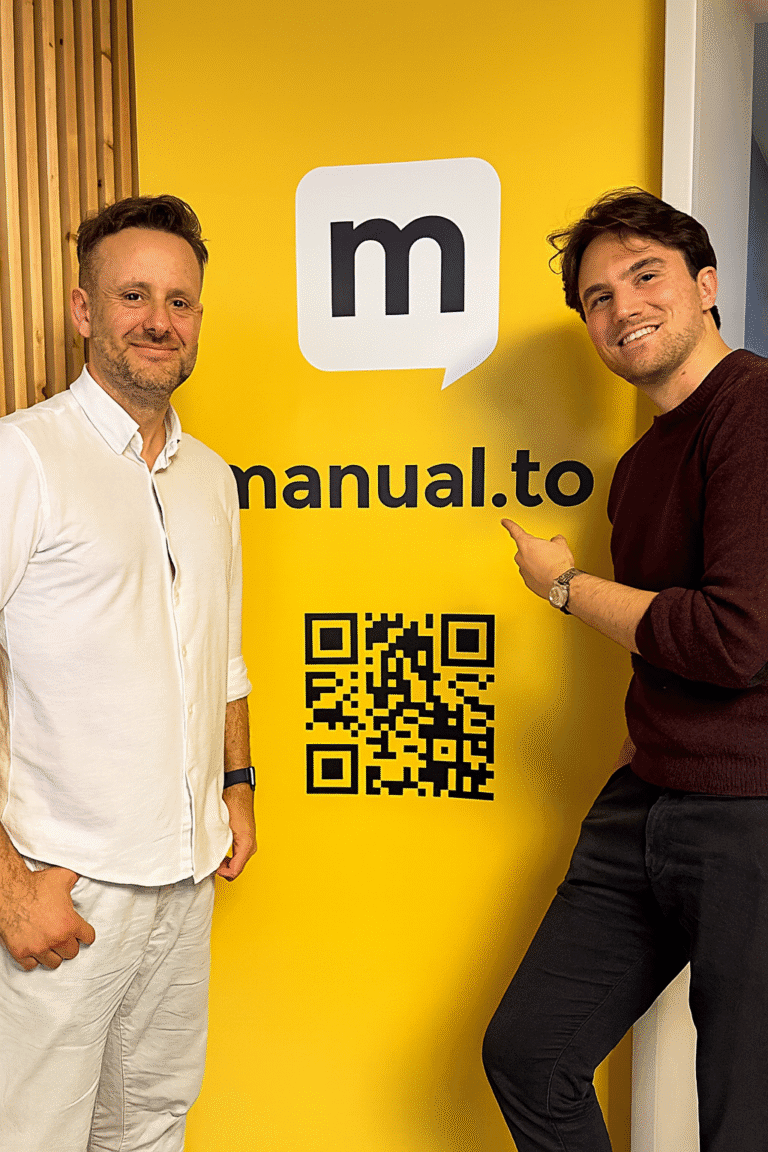Ben De Wit (Trans-IT): ‘Container transport needs AI-driven TMS’

A few months ago, Trans-IT became Start2Scale-up partner of Log!Ville. There, the young company presents its Transport Management System (TMS) and AI solutions, developed specifically for container transport. ‘Among other things, our TMS stands out by using AI to automatically read and process e-mails containing transport orders,’ explains co-founder and CEO Ben De Wit.
Can you briefly introduce Trans-IT?
Trans-IT is a ‘Software as a Service’ developer from Heist-op-den-Berg that was founded four years ago now. The solutions rely on two pillars: a Transport Management System (TMS) with a strong focus on container road transport and AI applications – such as reading and processing e-mails and PDFs to ‘feed’ the TMS with useful information. In other words, the transport orders that come in – and there are usually a lot of them – are read by AI, the relevant order data are automatically extracted from them so that they can be used in the TMS to plan trips efficiently.
How did the company come into existence?
About six years ago, Vince and Lars Vloeberghs took over the container transport company Vintra from their parents. From the start, they applied latest technology – Vince is an industrial engineer by training – and focused on automation. Four years ago, they knocked on Nick van Hoof’s door to write new software for a TMS that would be better suited to container transport, a sub-sector that has to take into account many specific requirements.
Together they founded the startup and developed an MVP (Minimum Viable Product), a kind of first version of the advanced TMS, which after a year was taken into use at Vintra. Meanwhile, Lars Vloeberghs also joined Trans-IT to take on sales, with his operational knowledge of the sector from Vintra being a major asset. In addition, Ismat Faizi also joined the team as an all-round programmer and in January we will hire our second full-time developper, Lander.
In mid-2023, Trans-IT started selling the TMS to other container transport companies. We now have a dozen customers and also two customers using our AI order entry technology on a daily basis.
Why has AI been added to the TMS?
There are two main reasons for this. Transport orders come in in many forms – mostly e-mails and PDFs – and it takes quite a bit of work to extract the relevant information and enter it into the TMS manually. AI-assisted data extraction can greatly ease that work. Second, predictive AI models can optimise routes, reduce fuel consumption and improve delivery times. Our algorithms also provide users with insights to make data-driven decisions and react quickly to disruptions, for example.
However, Trans-IT had little knowledge in the field of AI in-house. In late 2023, I was asked to develop those AI tools from my expertise in this field and integrate them into the TMS. For this innovative research project, we submitted a grant file to VLAIO to co-fund that development. In parallel, I became CEO and co-founder of Trans-IT to give Nick more space to focus on the further development of the TMS software. We are currently looking at submitting a follow-up grant file with VIL.
Are there any funding bodies behind the startup Trans-IT?
Currently, we are working on our own. Indirectly, Trans-IT was funded by Vintra, which paid for some features and developments in project mode. VLAIO’s grant also provided financial support.
To fund the next steps, we recently started looking for additional capital. We are thinking primarily of ‘business angels’ who bring not only money but also expertise and connections in the transport world and, more specifically, in the port area. We already have contact with companies such as Katoen Natie and DH, but our AI technology also offers added value for all companies where a lot of paperwork goes around, such as large forwarders.
What further steps are you thinking about?
As I’ve mentionded, container transport is very specific partly because the terminals in the ports use a multitude of systems for pre-notification, booking time slots, charging peak surcharges, certified collection, and so on. For our TMS, the focus in the coming months will be on interacting with those systems. This will not be easy, as they are complex and do not always function properly.
There are many TMSs on the market. What sets Trans-IT apart?
Apart from the fact that most of those TMSs are generic and not specifically developed for container transport, the distinguishing factors are mainly our operational expertise – the knowledge of the sector from the inside – and our thorough software expertise. The combination of both enables us to win our place in the market and we emerge as a challenger, especially now that we have also been able to bring in concrete AI solutions. We can also present results. For instance, thanks to Trans-IT’s TMS, Vintra significantly increased its efficiency in a short time, enabling it to double its turnover.
And, as I said, Lars has the advantage of knowing the industry’s pain points well. That helps remove distrust among container carriers.
How big is Trans-IT’s team?
There are six of us. Besides the three co-founders, they are a programmer, an AI consultant and a salesperson. We focus on Belgium – Flanders actually, because that’s where the container ports are located – and Luxembourg. The Netherlands and France are also target markets, but that will take some time because they use other digital systems to which we need to adapt our TMS.
Are your solutions modular?
Yes of course. The starting point was the planning part of our TMS and then we grafted modules onto it, such as the AI-driven module for document processing, a quotation module, a track & trace module. Now we are focusing on modules for order follow-up, such as sending real-time e-mails with the status of an order, automatic invoicing, calculating toll and route costs or analysis tools for case managers. Such a reporting dashboard shows, for example, empty vehicle kilometres, the most profitable routes, etc.
We have also developed a mobile app that assigns the transport order to a driver or subcontractor and allows him to share relevant information about the transport with the dispatch service, such as the CMR, photos of damaged containers, and so on.
What stands out is that you do not mention e-CMR?
A module to produce a digital waybill could definitely be useful. But there is no demand from the market yet: the vast majority of container carriers still use the paper CMR. If the demand comes, we will develop such a module.
The fact is that the industry is still quite conservative. Companies today feel that an automated document flow is more than necessary. Too much data needs to be processed at once, and then they realise that an AI-driven TMS will help them work better. But other layers of automation will only come when people are with them.
Where do you still see a role for AI in your offering?
Today, AI mainly helps to perform repetitive tasks and enter orders into the TMS. We have largely succeeded in this, in the sense that we can effectively enter 90-95% of orders automatically. In practice, this means that only the exceptions and last-minute updates, which often come in over the phone, are not processed automatically.
Our ultimate goal is to achieve automatic planning of journeys, with an algorithm combining them according to driving and rest times, expected waiting times at terminals and likely traffic jams en route. This is very variable data. Using historical data, AI can make fairly accurate predictions and calculate how much margin needs to be built in so as not to jeopardise the chain.
A first step in that process will be scheduling advice, where the planner still decides for himself how to organise the trips, but based on the insights and pattern recognition provided by AI algorithms.
Lastly: why did Trans-IT become a partner of Log!Ville?
We had been in contact with VIL for a long time, if only because it helped us take the first steps for the grant project at VLAIO. The step towards a partnership with Log!Ville was therefore quickly made. We present an interactive demo there where visitors can test our AI technology for themselves. That has already opened doors for us.
It also allowed us to make a substantive contribution during Logilaunch, the matchmaking event between mature companies and logistics startups. There, I spoke about AI-assisted solutions for smarter logistics.
Last but not least, there is also the networking aspect. Log!Ville gives us the opportunity to connect with interested companies and generate leads for possible collaborations with other partners or even commercial deals.
Want to know more about this Start2Scale partner? Click the following link for more information about Trans-IT.



